牛津版七年级英语下册Unit5grammer (共36张PPT)
文档属性
| 名称 | 牛津版七年级英语下册Unit5grammer (共36张PPT) |
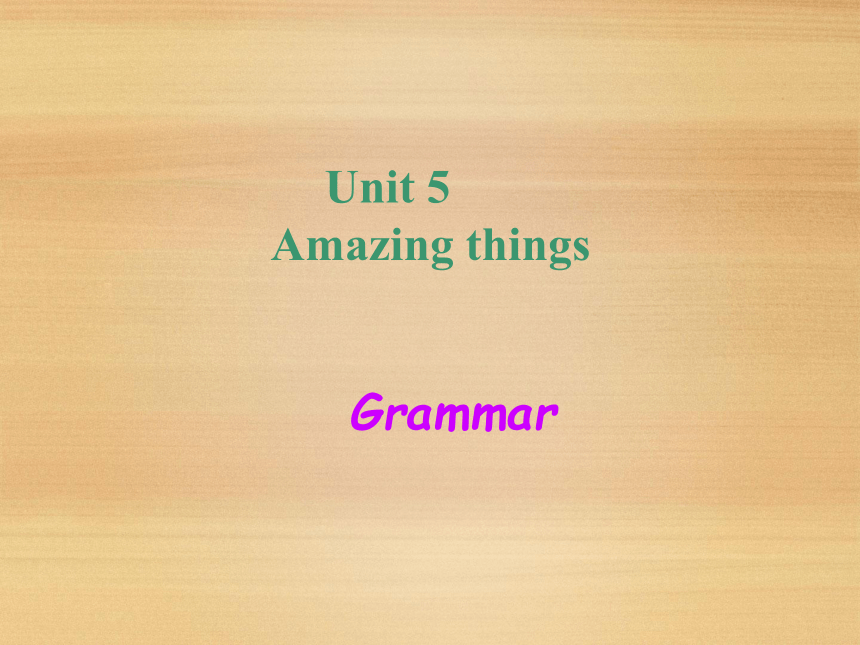
|
|
| 格式 | zip | ||
| 文件大小 | 8.1MB | ||
| 资源类型 | 教案 | ||
| 版本资源 | 牛津译林版 | ||
| 科目 | 英语 | ||
| 更新时间 | 2017-06-11 00:00:00 | ||
图片预览

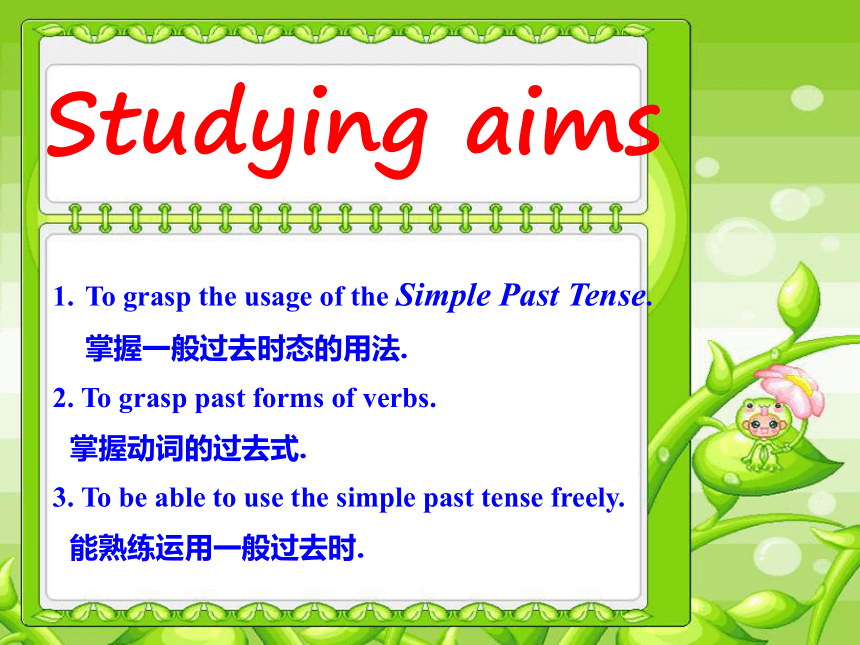
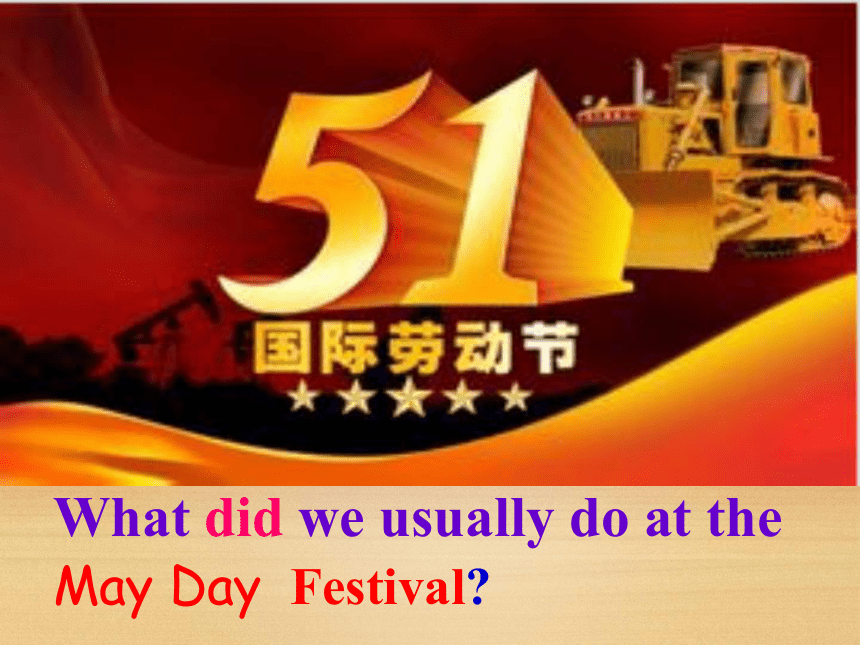
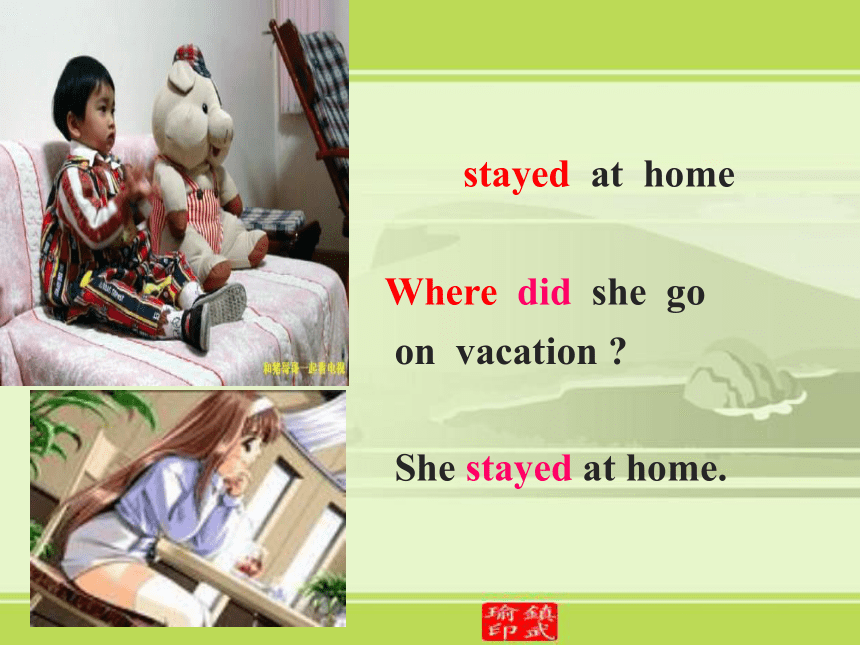
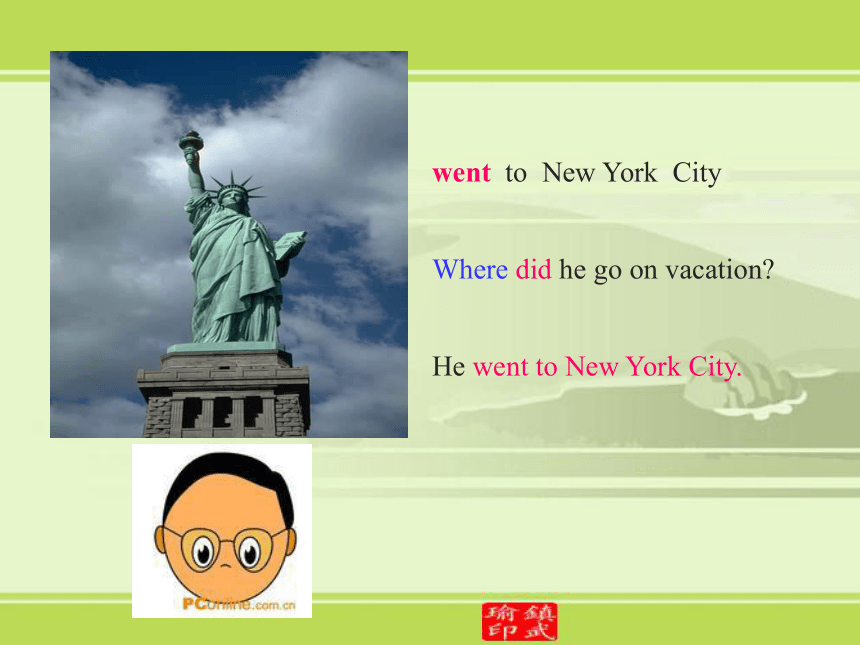
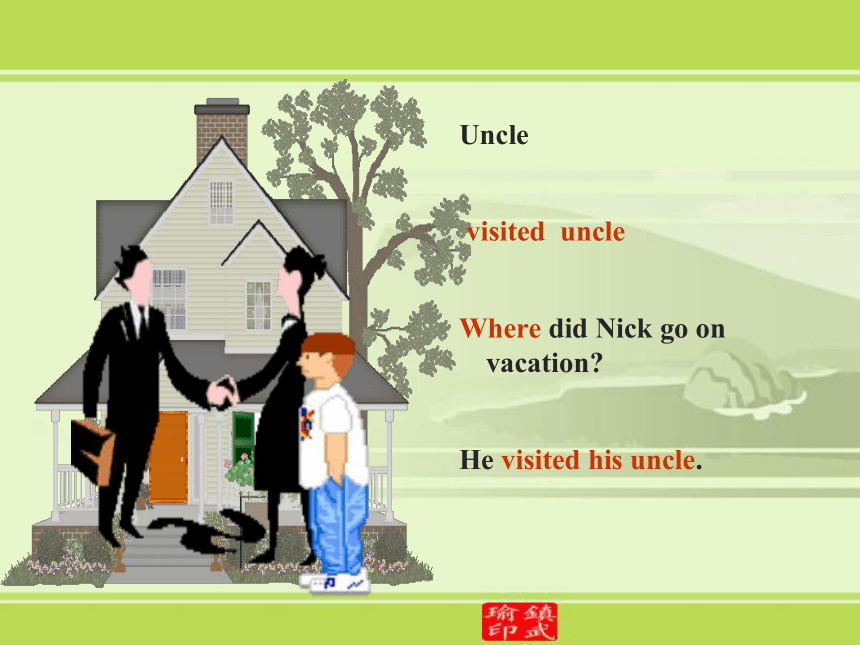
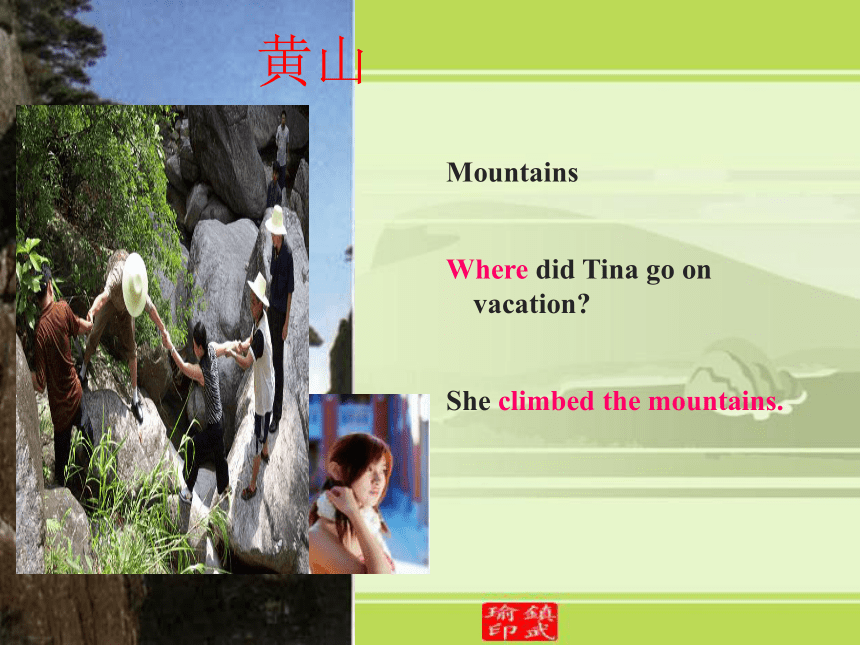
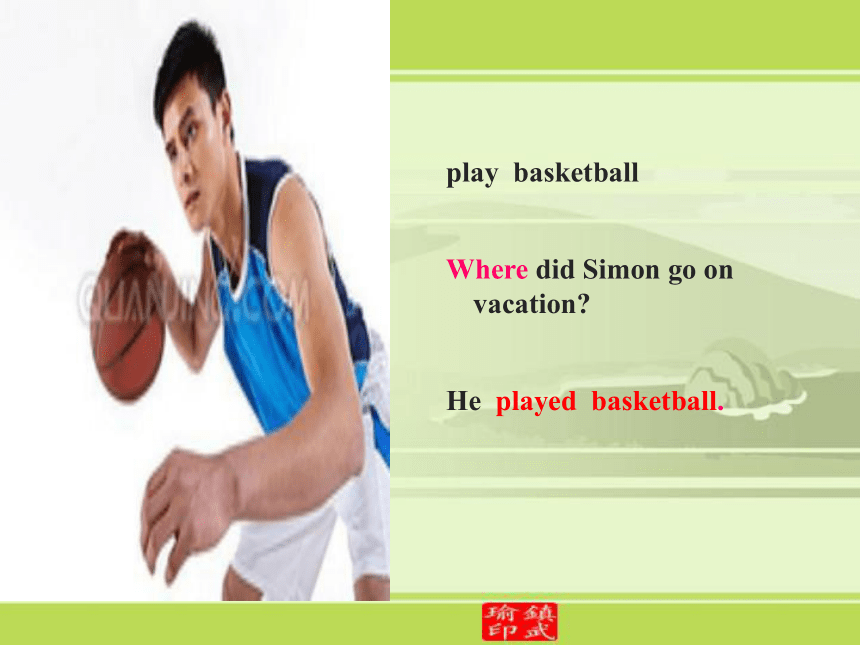
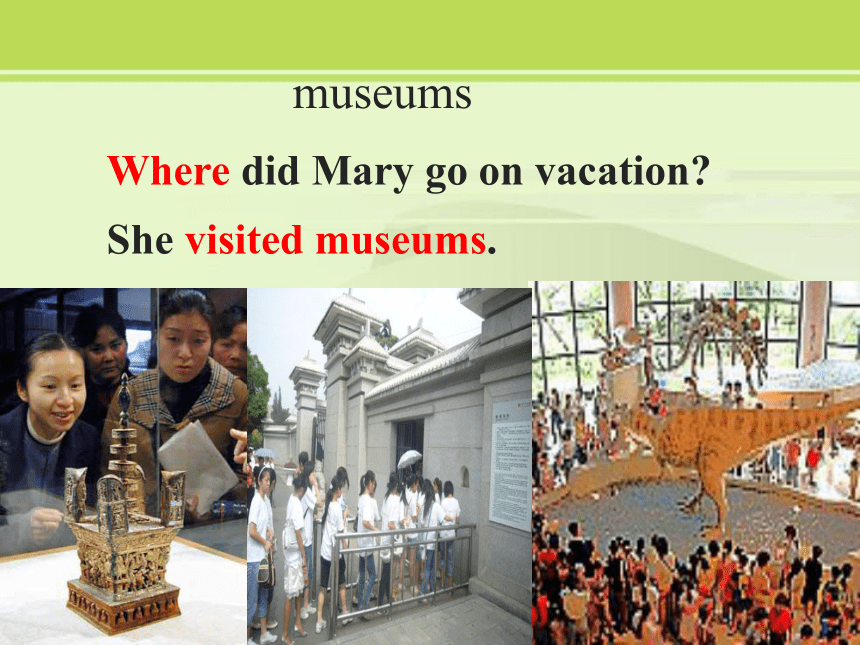
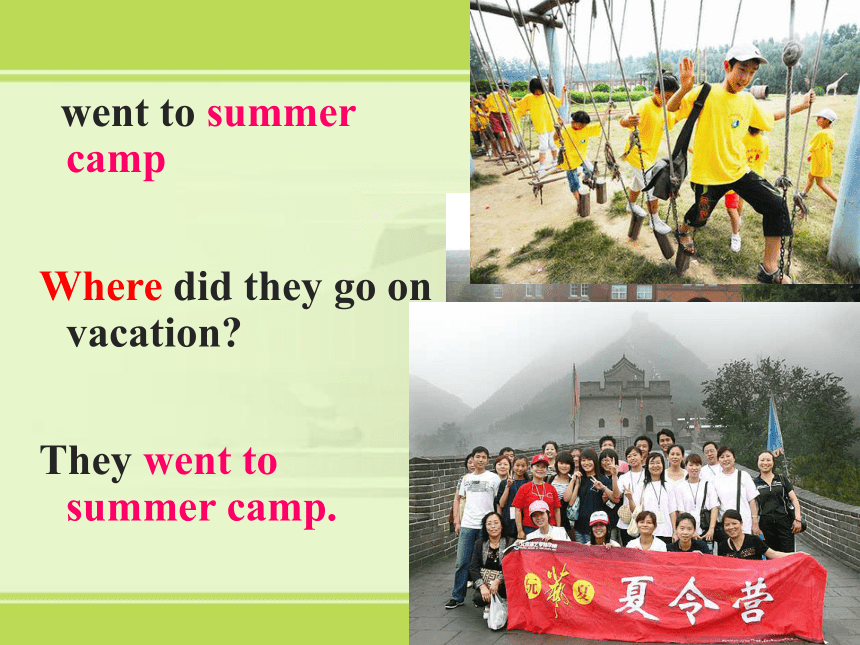
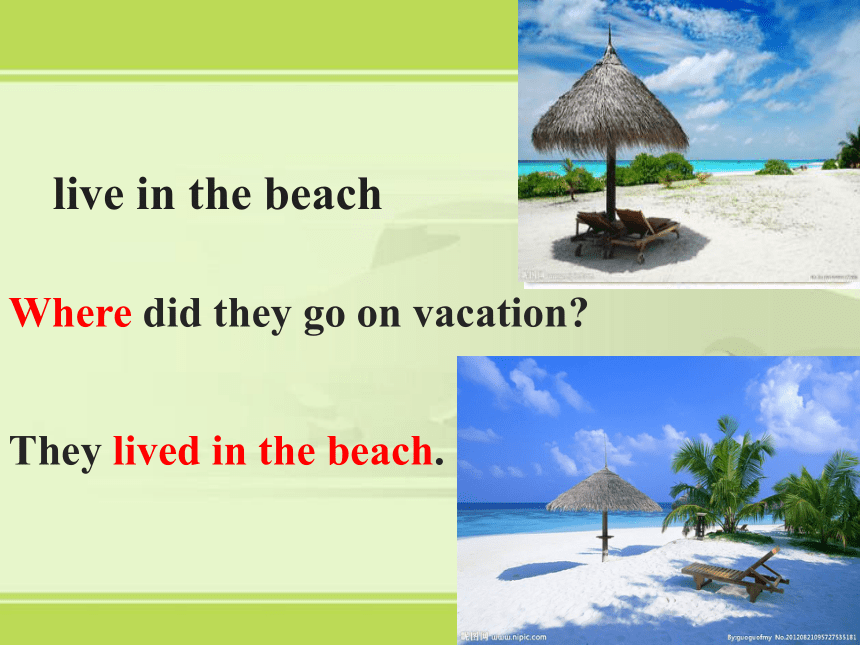
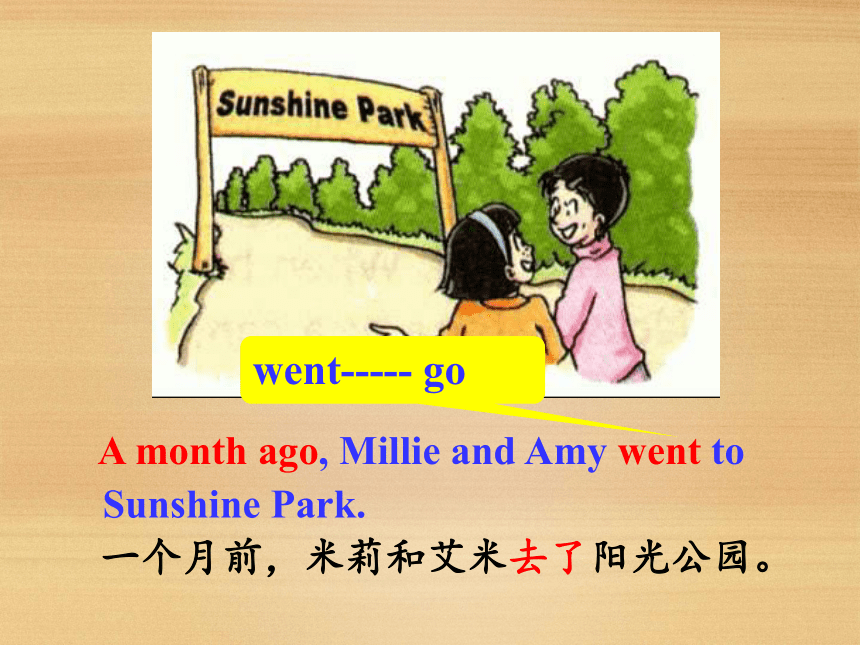
文档简介
课件36张PPT。Unit 5 Amazing thingsGrammarStudying aimsTo grasp the usage of the Simple Past Tense.
掌握一般过去时态的用法.
2. To grasp past forms of verbs.
掌握动词的过去式.
3. To be able to use the simple past tense freely.
能熟练运用一般过去时.What did we usually do at the May Day Festival?
stayed at home
Where did she go
on vacation ?
She stayed at home. went to New York City
Where did he go on vacation?
He went to New York City.Uncle
visited uncle
Where did Nick go on vacation?
He visited his uncle.Mountains
Where did Tina go on vacation?
She climbed the mountains.play basketball
Where did Simon go on vacation?
He played basketball.museumsWhere did Mary go on vacation?
She visited museums. went to summer camp
Where did they go on vacation?
They went to summer camp. Where did they go on vacation?
They lived in the beach.live in the beachwent----- go A month ago, Millie and Amy went to Sunshine Park.
一个月前,米莉和艾米去了阳光公园。 Last Sunday, they went to the park again.
上个星期天, 她们又去了那儿。did
played
went
flew
visited
took
liveddoplaygoflyvisittakelive过去式原形用于一般过去时一般过去时的用法 提示:表示过去的时间状语:
just now, yesterday,
yesterday morning/afternoon/evening,
last night/week/month/year, in 2008, a month ago, ten years ago …1.表示过去某个时间发生的动作或存在的状态。2. 规则性动词如何加 ‘-ed ’ 的形式.提示: 以元音字母+y结尾的动词
按第一条规则,即:+ed,
如: stay —stayed play--playedwant— talk —
like — worry —
try — stop — wanted talked liked worried tried stopped 写出下列动词的过去式。规则动词-ed的读音
1、清念 /t/ ,即 ed 在清辅音后面念 /t/ ,
例: finished helped passed cooked
2、元浊 /d/ ,即 ed 在元音,浊辅音后面念 /d/ ,
例:borrowed enjoyed called moved
3、/t/ /d/ 之后念 /id/ , 即 ed 在 /t/ /d/ 音后面念 /id/
例:wanted shouted needed counted
3.不规则动词的过去式不是加ed 构成的, 需要我们记住它们。不规则动词的过去式归纳起来有这样几种类型(见下表):Infinitive Past tense
am/ is was
are were
begin began
become became
bring brought
build built
buy bought
can couldInfinitive Past tense
catch caught
come came
do did
draw drew
drink drank
eat ate
get got
fly flew不规则动词表 写出动词的过去式:
1.go__________ 2.sit___________
3.hear_________ 4.turn_________
5.can__________ 6.ask__________
7.reply__________ 8.leave_________
9.run__________ 10.see__________
11.happen________ 12.say__________
13.tell__________ 14.stand________
15.look_________ 16.come________
17.search________ 18.find_________
19.make_________ 20.put__________
21.pick_________ 22.take_________ went sat heard turned could asked repliedleft ran saw happened said told stood looked came searched found made putpicked took start ______
love _________
play ______
plan ______9. leave _____
10. tell _____
11. stand _____
12. bring ______5. reply _____
6. say ________
7. meet _____
8. hear ______startedplayedlovedplannedsaidrepliedleftmetstoodtoldheardbroughtPracticeFinish Part A on page 62.This morning, we _____ (go) to the Fun World Museum. When we ____ (get) to the museum, there _____ (be) a lot of people there. We _____ (spend) three hours in the museum. I ____ (take) a lot of photos. Some of us _______ (buy) cards of the animals there. We _____ (come) back to school at 1 p.m. We ____ (have) a great time!wentwerespenttookboughtcamehadgotFinish Part B on page 62.Millie: We _____ (go) to the Fun World Museum
the day before yesterday, Daniel. It ____
(be) so interesting!
Daniel: Really? Tell me all about it.
Millie: OK. We ____ (see) a small monkey, only
11 centimetres tall.
Daniel: That’s amazing! What else?
Millie: We also _______ (learn) about some
strange birds like dodos. They _____ (live)
on the earth a long time ago.
Daniel: That’s cool!wentsawwaslearntlivedFinish Part C on page 62. Talk about: past and presentDiscussion in groupsIn the past, the road was small and dirty, but now the road is wide and clean. In the past, the houses were small and old, but now the houses are tall and nice. In the past, people went to someplace by jiaozi or on the carriage.Now, people go to someplace by car, plane, train or bus.
Exercises1. I _______ (be) born in 2000.
2. We ________ (take) a lot of photos last month.
3. Tom ______ (put) the books in the bag and left the classroom.
4. I _______ (see) a UFO in the sky last night.
5. We _______ (be) at home yesterday.
6. The students _______ (have) a Chinese lesson just now.
7. We _______ (eat) some baozi for breakfast this morning.
8. She _________ (buy) a book the day before yesterday.
9. Our classmates _________ (visit) Huangqiao Park last weekend.
10. He ______ in Shanghai three years ago, but now he ______
in Taixing. (live)
用所给词的适当形式填空wastookputsawwerehadateboughtvisitedlivedlives1. Lucy did her homework at home.(改否定句)
Lucy ______ ___ her homework at home.
2. He found some meat in the fridge. (变一般疑问句)
____ he ____ ____ meat in the fridge?
3. She stayed there for a week. (对划线部分提问)
____ ____ ___ she ____ there?
4. There was some orange in the cup. (变一般疑问句)
_____ there ___ orange in the cup? didn’t do
Did find any
How long did stay
Was any改写句子。We should treasure we have. We mustn’t waste time ,money or food.Now we have wide and clean roads, tall and nice houses. And we have a happy life.Now we each can go to school to get knowledge. We must study harder, because knowledge is power(力量). Knowledge is wealth(财富).HomeworkRemember the irregular verbs.Thank you!
掌握一般过去时态的用法.
2. To grasp past forms of verbs.
掌握动词的过去式.
3. To be able to use the simple past tense freely.
能熟练运用一般过去时.What did we usually do at the May Day Festival?
stayed at home
Where did she go
on vacation ?
She stayed at home. went to New York City
Where did he go on vacation?
He went to New York City.Uncle
visited uncle
Where did Nick go on vacation?
He visited his uncle.Mountains
Where did Tina go on vacation?
She climbed the mountains.play basketball
Where did Simon go on vacation?
He played basketball.museumsWhere did Mary go on vacation?
She visited museums. went to summer camp
Where did they go on vacation?
They went to summer camp. Where did they go on vacation?
They lived in the beach.live in the beachwent----- go A month ago, Millie and Amy went to Sunshine Park.
一个月前,米莉和艾米去了阳光公园。 Last Sunday, they went to the park again.
上个星期天, 她们又去了那儿。did
played
went
flew
visited
took
liveddoplaygoflyvisittakelive过去式原形用于一般过去时一般过去时的用法 提示:表示过去的时间状语:
just now, yesterday,
yesterday morning/afternoon/evening,
last night/week/month/year, in 2008, a month ago, ten years ago …1.表示过去某个时间发生的动作或存在的状态。2. 规则性动词如何加 ‘-ed ’ 的形式.提示: 以元音字母+y结尾的动词
按第一条规则,即:+ed,
如: stay —stayed play--playedwant— talk —
like — worry —
try — stop — wanted talked liked worried tried stopped 写出下列动词的过去式。规则动词-ed的读音
1、清念 /t/ ,即 ed 在清辅音后面念 /t/ ,
例: finished helped passed cooked
2、元浊 /d/ ,即 ed 在元音,浊辅音后面念 /d/ ,
例:borrowed enjoyed called moved
3、/t/ /d/ 之后念 /id/ , 即 ed 在 /t/ /d/ 音后面念 /id/
例:wanted shouted needed counted
3.不规则动词的过去式不是加ed 构成的, 需要我们记住它们。不规则动词的过去式归纳起来有这样几种类型(见下表):Infinitive Past tense
am/ is was
are were
begin began
become became
bring brought
build built
buy bought
can couldInfinitive Past tense
catch caught
come came
do did
draw drew
drink drank
eat ate
get got
fly flew不规则动词表 写出动词的过去式:
1.go__________ 2.sit___________
3.hear_________ 4.turn_________
5.can__________ 6.ask__________
7.reply__________ 8.leave_________
9.run__________ 10.see__________
11.happen________ 12.say__________
13.tell__________ 14.stand________
15.look_________ 16.come________
17.search________ 18.find_________
19.make_________ 20.put__________
21.pick_________ 22.take_________ went sat heard turned could asked repliedleft ran saw happened said told stood looked came searched found made putpicked took start ______
love _________
play ______
plan ______9. leave _____
10. tell _____
11. stand _____
12. bring ______5. reply _____
6. say ________
7. meet _____
8. hear ______startedplayedlovedplannedsaidrepliedleftmetstoodtoldheardbroughtPracticeFinish Part A on page 62.This morning, we _____ (go) to the Fun World Museum. When we ____ (get) to the museum, there _____ (be) a lot of people there. We _____ (spend) three hours in the museum. I ____ (take) a lot of photos. Some of us _______ (buy) cards of the animals there. We _____ (come) back to school at 1 p.m. We ____ (have) a great time!wentwerespenttookboughtcamehadgotFinish Part B on page 62.Millie: We _____ (go) to the Fun World Museum
the day before yesterday, Daniel. It ____
(be) so interesting!
Daniel: Really? Tell me all about it.
Millie: OK. We ____ (see) a small monkey, only
11 centimetres tall.
Daniel: That’s amazing! What else?
Millie: We also _______ (learn) about some
strange birds like dodos. They _____ (live)
on the earth a long time ago.
Daniel: That’s cool!wentsawwaslearntlivedFinish Part C on page 62. Talk about: past and presentDiscussion in groupsIn the past, the road was small and dirty, but now the road is wide and clean. In the past, the houses were small and old, but now the houses are tall and nice. In the past, people went to someplace by jiaozi or on the carriage.Now, people go to someplace by car, plane, train or bus.
Exercises1. I _______ (be) born in 2000.
2. We ________ (take) a lot of photos last month.
3. Tom ______ (put) the books in the bag and left the classroom.
4. I _______ (see) a UFO in the sky last night.
5. We _______ (be) at home yesterday.
6. The students _______ (have) a Chinese lesson just now.
7. We _______ (eat) some baozi for breakfast this morning.
8. She _________ (buy) a book the day before yesterday.
9. Our classmates _________ (visit) Huangqiao Park last weekend.
10. He ______ in Shanghai three years ago, but now he ______
in Taixing. (live)
用所给词的适当形式填空wastookputsawwerehadateboughtvisitedlivedlives1. Lucy did her homework at home.(改否定句)
Lucy ______ ___ her homework at home.
2. He found some meat in the fridge. (变一般疑问句)
____ he ____ ____ meat in the fridge?
3. She stayed there for a week. (对划线部分提问)
____ ____ ___ she ____ there?
4. There was some orange in the cup. (变一般疑问句)
_____ there ___ orange in the cup? didn’t do
Did find any
How long did stay
Was any改写句子。We should treasure we have. We mustn’t waste time ,money or food.Now we have wide and clean roads, tall and nice houses. And we have a happy life.Now we each can go to school to get knowledge. We must study harder, because knowledge is power(力量). Knowledge is wealth(财富).HomeworkRemember the irregular verbs.Thank you!
